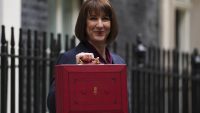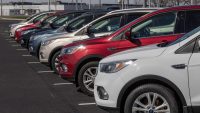Last month was the best May for new car registrations for four years – but heavy discounts on new EVs drove the growth, new figures show.
Latest data from the Society of Motor Manufacturers and Traders (SMMT) shows that 150,070 units were registered last month, a rise of 1.6%.
It was the best May performance for four years and the second month of growth in 2025.
But it was still 18.3% down on pre-pandemic May 2019, reflecting ‘brittle consumer confidence and economic turbulence’, said the SMMT.
Fleets and businesses drove the growth, up 3.7% and 14.4% respectively and responsible for 62.6% of registrations.
Demand from private buyers fell for the second consecutive month, down 2.3%.
The body also tempered the positivity by saying that the rise in registrations was helped by continued discounting on new electric vehicles.
Registrations of battery electric vehicles rose by 25.8%, and accounted for 21.8% of the new market.
The SMMT said that ‘significant discounting is still ongoing despite new model introductions and increasingly affordable offerings’.
It added that with BEV registrations year-to-date having only reached 20.9% market share and still some seven percentage points off the ZEV Mandate 28% figure for 2025, the current situation is ‘unsustainable for a sector already facing multiple cost pressures’.
Meanwhile, hybrids were up 6.8% to 20,351 units and plug-in hybrids were up more than half (50.8%) to 17,898. Petrol and diesel cars, though, fell 12.5% and 15.5% respectively.
The Ford Puma returned to the top-spot in May, achieving 3,695 registrations, followed by the Kia Sportage (3,256) and the Nissan Qashqai (3,088).
The Puma holds onto its year-to-date first place ranking with 21,936. The Sportage is second with 19,636 and the Qashqai follows in third with 17,077.
Commenting on the data, SMMT chief Mike Hawes said: ‘A return to growth for new car registrations in May is welcome but manufacturer discounting on new products continues to underpin the market, notably for electric vehicles.
‘This cannot be sustained indefinitely as it undermines the ability of companies to invest in new product development – investments which are integral to the decarbonisation of all road transport.
‘Next week’s Spending Review is the opportunity for government to double down on its commitments to Net Zero by driving demand through fiscal measures that boost the market and shore up our competitiveness.’


































